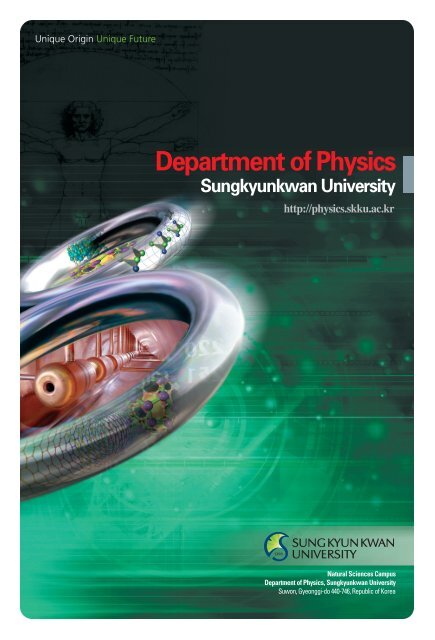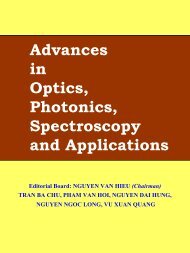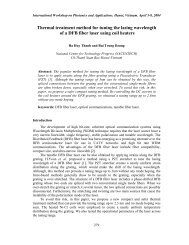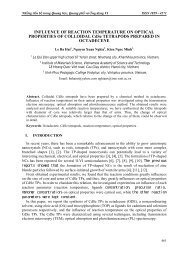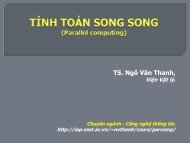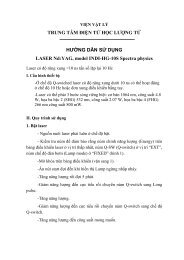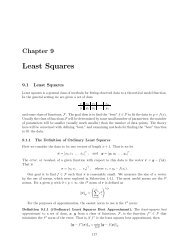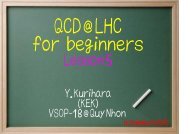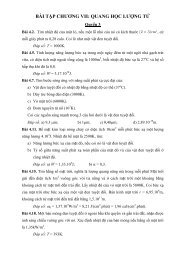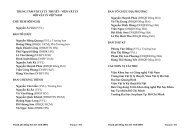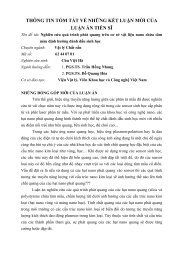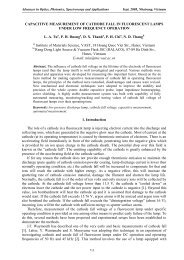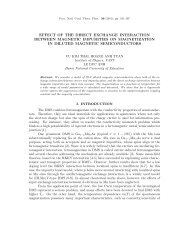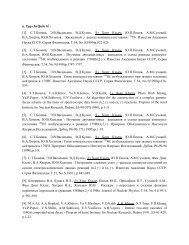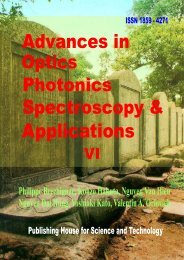Nuclear/Particle Physics
Nuclear/Particle Physics
Nuclear/Particle Physics
Create successful ePaper yourself
Turn your PDF publications into a flip-book with our unique Google optimized e-Paper software.
http://physics.skku.ac.kr<br />
Natural Sciences Campus<br />
Department of <strong>Physics</strong>, Sungkyunkwan University<br />
Suwon, Gyeonggi-do 440-746, Republic of Korea
VISION<br />
Sungkyunkwan<br />
University<br />
<strong>Physics</strong><br />
Research Group<br />
Produce Creative Research<br />
Activities from Fundamental<br />
<strong>Physics</strong><br />
Dedicate Creative<br />
Knowledge to Applied<br />
<strong>Physics</strong><br />
Research :<br />
A Leading<br />
Graduate School<br />
in Research<br />
Fundamental Basic<br />
Research Program<br />
Advanced Technology<br />
Development Program<br />
Education :<br />
Human<br />
Resources<br />
Development<br />
<strong>Nuclear</strong>/<br />
<strong>Particle</strong> <strong>Physics</strong><br />
Track<br />
Condensed<br />
Matter/<br />
Statistical <strong>Physics</strong><br />
Acoustics Track<br />
Nano <strong>Physics</strong><br />
Track<br />
Department of <strong>Physics</strong><br />
Sungkyunkwan University
Overview : Some Statistics in 2007<br />
<strong>Nuclear</strong> /<br />
<strong>Particle</strong> <strong>Physics</strong> : 7<br />
Nanophysics : 7<br />
Number of Faculties<br />
in Major Research Areas<br />
Condensed Matter /<br />
Statistical <strong>Physics</strong> &<br />
Acoustics: 9<br />
Faculty members : 23<br />
Research Professors : 14<br />
Number of Researchers<br />
Graduate Students: 102<br />
Post-doctoral<br />
Fellows : 15<br />
Number of Students<br />
Undergraduate Students: 121<br />
Research Grants &<br />
Journal Publications<br />
Total Amount of<br />
Research Grants:<br />
US $ 4.9 M<br />
Number of Journal<br />
Publications per Year: 223
Main Research Fields<br />
<strong>Nuclear</strong>/<strong>Particle</strong> <strong>Physics</strong><br />
Research Field :<br />
<strong>Nuclear</strong> <strong>Physics</strong> / Elementary <strong>Particle</strong> <strong>Physics</strong> / Quantum Field theory / Cosmology /<br />
String theory / Astroparticle <strong>Physics</strong> / Astronuclear <strong>Physics</strong> / <strong>Nuclear</strong> Applications<br />
Research Laboratory<br />
<strong>Nuclear</strong> <strong>Physics</strong> Lab. (Theory) (Dr. Byung-Taik Kim, Dr. Seung-Woo Hong)<br />
Elementary <strong>Particle</strong> and <strong>Nuclear</strong> <strong>Physics</strong> Lab. (Experiment) (Dr. Young-Il Choi)<br />
<strong>Particle</strong> <strong>Physics</strong> Lab. (Theory) (Dr. Phillial Oh, Dr. Yoonbai Kim)<br />
High Energy <strong>Physics</strong> Lab. (Experiment) (Dr. Intae Yu)<br />
<strong>Particle</strong> <strong>Physics</strong> Lab. (Experiment) (Dr. Suyong Choi)<br />
Condensed Matter/Statistical <strong>Physics</strong> & Acoustics<br />
Research Field :<br />
Many-Body System / Phase Transition and Criticality / Spectroscopy /<br />
Superconductivity / Semiconductor / Magnetic Materials / Surface <strong>Physics</strong> /<br />
Low Temperature <strong>Physics</strong> / Acoustics<br />
Research Laboratory<br />
Acoustics Research Lab. (Experiment) (Dr. Suk Wang Yoon)<br />
Low Temperature Lab. (Experiment) (Dr. Mu-Yong Choi)<br />
Condensed Matter <strong>Physics</strong> Lab. (Theory) (Dr. Han-Yong Choi)<br />
Magnetism & Magnetic Materials Lab. (Experiment) (Dr. Yong Seung Kwon)<br />
Magnetic Materials Lab. (Experiment) (Dr. Je-Geun Park)<br />
Manybody <strong>Physics</strong> Lab. (Theory) (Dr. Jung Hoon Han)<br />
Statistical <strong>Physics</strong> Lab. (Theory) (Dr. Beom Jun Kim)<br />
Superconductivity & Thin Film Lab. (Experiment) (Dr. Won Nam Kang)<br />
Extreme Physical Science Lab. (Experiment) (Dr. Tuson Park)<br />
Nanophysics<br />
Research Field :<br />
Nanomaterial Fabrication / Nanoscience Applications / Bioelectronic devices / Nanobiophysics<br />
Research Laboratory<br />
Nanophysics Lab. (Experiment) (Dr. Chong-Yun Park)<br />
Carbon Nanotube Research Lab. (Experiment) (Dr. Young Hee Lee)<br />
Semiconductor and Nano Application Lab. (Experiment) (Dr. Donggeun Jung)<br />
Magneto-photonics Research Lab. (Theory) (Dr. Joo Yull Rhee)<br />
Nanoscience Lab. (Experiment) (Dr. Dae Joon Kang)<br />
Nanotechnology Lab. (Experiment) (Dr. Jong Real Ahn)<br />
Applied DNA NanoEngineering Lab. (Experiment) (Dr. Sung Ha Park)<br />
For more information, visit a research laboratory webpage,<br />
http://physics.skku.ac.kr/laboratory/laboratory1_e.asp/
Key Research Centers Related to the Department<br />
BK21 <strong>Physics</strong> Research Division<br />
Director, Prof. Young Hee Lee<br />
BK21 <strong>Physics</strong> Research Division consists of 3 teams (<strong>Nuclear</strong>/<strong>Particle</strong> <strong>Physics</strong>, Condensed<br />
Matter/Statistical <strong>Physics</strong>, and Nanophysics Groups) with emphasis on quality education and<br />
excellent research.<br />
Goals of BK21 program are human resources development, cultivate leading graduate<br />
schools in research and cooperation with various industries.<br />
BK21 program is supported by the Ministry of Education, Science and Technology<br />
Center for Nanotubes and Nanostructured Composites(CNNC)<br />
Director, Prof. Chong-Yun Park<br />
The major research focuses on the fundamental studies related to the clarification and the<br />
understanding of new physical and chemical phenomena in nanomaterials and nanostructured<br />
composites, and utilizing their unique properties for commercial applications, building the basis of<br />
nanotechnology.<br />
CNNC was established in 2001 as a part of the upbringing programs of Korea Science &<br />
Engineering Foundation (KOSEF) for Science Research Centers.<br />
Basic Atomic Energy Research Institute (BAERI)<br />
Director, Prof. Seung-Woo Hong<br />
The institute was established in 2006 as a basic research center for nuclear technology development<br />
supported by the Ministry of Education, Science and Technology.<br />
The institute is dedicated to the understanding of how matters change in the environment of<br />
various different types of radiations.<br />
Simulations and visualization of effects of radiation on matter are the major issues studied in the<br />
institute. We also perform microscopic measurements and studies of changes of matter such as<br />
magnetic materials, superconductors and semiconductors due to radiation.<br />
Financial Aid for Graduate Students in the Department<br />
Simsan Scholarship(2.6%)<br />
TA/RA & AP<br />
Scholarships(8%)<br />
Gyeonggi Province<br />
Matching Fund(7.8%)<br />
BK21 Scholarship(34%)<br />
Scholarship for Graduate<br />
Students in the Department of<br />
<strong>Physics</strong> in 2007<br />
(US $ 1.6 M)<br />
Semiconductor System<br />
Scholarship(1.8%)<br />
Science and Engineering<br />
Scholarship(0.8%)<br />
Research Scholarship<br />
Fund(45%)<br />
Average Stipend per Graduate Student: US $1.5 K/month<br />
For undergraduate students, there are various types of scholarships available and<br />
almost all foreign students will be provided with scholarships.<br />
For more information, visit http://www.skku.edu/eng
About Sungkyunkwan University<br />
The Sungkyunkwan University is synonymous with both tradition and innovation in education<br />
and research in Korea. The University faculty members of more than 1,000 are committed to<br />
quality teaching and research, offering students a challenging environment for intellectual and<br />
personal growth. Sungkyunkwan was founded in 1398 by royal decree to promote the<br />
scholarship in Confucianism.<br />
As Korea modernized and underwent social and economic reforms during 1950s, Old<br />
Sungkyunkwan underwent a transition to a private university. Though a long history alone<br />
cannot guarantee the excellence of an institution, the rich culture, which exudes from a long<br />
tradition, is surely a unique and valuable asset of the University. The University operates two<br />
campuses: the Humanities and Social Sciences Campus in Seoul and the Natural Sciences<br />
Campus in Suwon. Tradition and modernity coexist in Suwon; the World Cultural Heritage,<br />
Hwaseong, is located nearby and high-tech industries like Samsung are spreading around<br />
harmoniously.<br />
The headquarter of Samsung Electronics, which is one of the leaders of silicon-based industries<br />
is located in Suwon. With these invaluable resources, Suwon is known as a Silicon Valley in<br />
Korea. The University has a strong interconnection with Samsung Electronics, Samsung<br />
Advanced Institute of Technology, and Gyeonggi Province NanoFab for the intensive<br />
collaboration and mutual interests. Consequently as a contemporary center of higher education,<br />
the University is well located in pursuit of excellence in a broad range of Science and Technology.<br />
With a successful partnership with the Samsung Foundation since 1996, the University has<br />
been further developed. With Samsung’s management capability and lavish financial support,<br />
the University has repositioned itself as a specialized research-oriented university. The<br />
University has opened up a possibility to become one of the most prestigious universities and<br />
is striving to become one of the leading universities in the world.
Student Profiles in the Department<br />
Hoang Anh Tuan Kiet<br />
A Post-Doc. Researcher, Dept. Alumi, Nationality: Vietnam<br />
Sungkyunkwan University physics department offers an outstanding academic<br />
and professional environment for students and researchers. Interacting with<br />
and learning from the excellent faculty members with various research and<br />
professional backgrounds help me tremendously enhance competent<br />
knowledge. Professors and staffs are very dedicated to their students. The<br />
research and experimental facilities are modern and convenient to develop<br />
students the practical abilities. Seminar and class approach make the curriculum particularly<br />
appealing that develop students’ intellectual and creative capabilities. These make SKKU a truly top<br />
in Korea and Asia. I highly appreciate the professors and the rewarding experience in SKKU. SKKU<br />
is striving to become one of the leading universities in the world.<br />
Danielle Rhen<br />
A Ph.d. Grad. Student, Nationality: USA<br />
The SKKU physics department’s main focus is research which ranges from<br />
experimental particle physics to theoretical solid state physics and has<br />
produced many top-level papers, in world class journals. I am very happy with<br />
my choice and feel that this is a very enthusiastic and exciting environment,<br />
equipped with the experimental systems and talent necessary for making<br />
fundamental contributions to important and internationally competitive<br />
research. My experience here has been very warm and motivating as well as challenging.<br />
Additionally I have been given many opportunities to collaborate with national laboratories and<br />
international universities thus creating a global network for my career. After having been a student at<br />
various schools around the world and noting SKKU’s strong collaborations with some of the world’s<br />
best institutions, I am sure that SKKU physics department is, or will soon be, one of the top<br />
departments in Asia and eventually in the world.<br />
Junghoon Kim<br />
A Ph.d. Grad. Student, Nationality: Korea<br />
Hi, my name is Junghoon Kim. I am working on the theoretical aspects of<br />
frustrated spin systems. Frustration is a phenomenon which arises when all<br />
the interactions of a system cannot be simultaneously satisfied. One of the<br />
reasons for this is due to the underlying lattice itself, as in the case of the<br />
pyrochlore lattice, a repetitious arrangement of corner sharing tetrahedra. This<br />
can give rise to many different orders in the system and lead to exotic phases,<br />
one of which is the long sought-after spin liquid phase. Research in our group is very demanding but<br />
also very fulfilling. We employ analytical as well as computational methods to conduct our research.<br />
The students, professors, and researchers here are highly ardent about their work but not to the<br />
point where they don't share their time with others, for they are also very friendly and approachable.<br />
My overall experience here is one that I can confidently say I could not have gained anywhere else.
Many people ask me about my specialty in University. When I answer that I am a physicist, they<br />
immediately responded that I must be a genius and they look at me with a kind of awe. I believe this<br />
feeling of awe includes some degrees of respect because physics is beyond the capacity of<br />
understanding to most people. This sort of misunderstanding originates from our attitudes towards<br />
students. In old days, science belonged to noble class who has enough time to think without worrying<br />
about their living with money. This tradition extends even nowadays to ourselves. Professors simply<br />
sit in the office and wait for students to come to discuss. We do not open our door to students with<br />
warm heart or even don’t welcome them coming into our territory. Instead we pretend that we know<br />
everything and hide ourselves with authority rather than scientific truth. This builds a great wall<br />
against students causing science to become a holy field of respect without understanding the core.<br />
As a research scientist, not as a chairman of the department, I like to welcome students to SKKU<br />
undergraduate and graduate schools with warmest heart. Those who have a brave heart to share our<br />
society s burden and are willing to contribute their passion to develop new fundamental knowledge<br />
and advanced technology, are all welcome to our department. We do not need a genius. We do need<br />
students who can say, yes, I will try, when someone says, no, that is impossible.<br />
I do admit that physics requires hard working students mainly because the amount of works to master<br />
during undergraduate and graduate course works is enormous. This may be a good excuse for<br />
students to be scared off from physics. However, if you like to challenge in science and if you dare to<br />
dream, I do encourage you to enter our department and to spend your life with passion in<br />
understanding nature and challenging yet unsolved problems in science and engineering.<br />
I am looking forward to seeing you in the Department of <strong>Physics</strong> at Sungkyunkwan University in near<br />
future.<br />
Yours Sincerely,<br />
Message<br />
From the Chair, Prof. Young Hee Lee<br />
To Prospective Degree-Seeking Student :<br />
If you would like to apply for Undergraduate Degree and Graduate Program in <strong>Physics</strong> Department at<br />
Sungkyunkwan University, you may drop by school admission office’s webpage,<br />
http://www.skku.edu/eng


